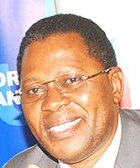Private sector umbrella boss advises on bigger enterprises
December 12—Ugandan business people have been told to learn to work closer together by forming bigger commercial enterprises or cooperatives if they want to tap larger amounts of credit for expansion.
“In two years, Uganda is aspiring to be a middle-income country with every Ugandan being able to earn $1000 a year. This will be impossible if we do not reorganise the private sector which is largely informal,” Gideon Badagawa (right), the Executive Director of the Private Sector Foundation Uganda (PSFU) said recently.
He was speaking at an event organized by PSFU for small and medium enterprise owners (SMEs) who had applied for grants under the Skills Development Facility (SDF) predominantly funded by the World Bank.
It was rolled out at the beginning of 2017 by PSFU in partnership with the finance ministry to provide advanced training for employees in large companies, teaching institutions and SMEs. The aim is improving productivity and capacity for Ugandans especially those in agriculture, manufacturing and the construction sector.
Badagawa said with the current state of SMEs, only a few are able to access large credit from banks and grants from development partners, because of the risk associated with dealing with informal businesses. “A cooperative or a group of farmers would easily access a grant or a bank loan than an individual,” Badagawa said.
According to the World Bank, access to credit by the private sector from commercial banks is still very low at 6% mainly because the private sector is viewed as risky and many business people do not have adequate collateral or security needed to secure loans.
Due to this, Uganda’s private sector is dominated by informal businesses with no ability to expand into bigger sectors like manufacturing and exportation
According to Ruth Biyinzika, the Head SDF, the second window which is for the cooperatives, NGOs and associations from the informal sector, is almost complete with over 200 groups of the 2000 that applied expected to benefit from the allocated UGX11 billion (about $3 million).
“In this group, we are targeting mainly women and youth groups that are able to train a large number of youth as well as provide employment. We selected enterprises that are able to created positive change in their communities, increase production for export and add-value to our local products,” Biyinzika said. The PSFU continues to scrutinize groups that qualify to make sure the money does not go to waste or get misused.
She advised the selected groups to follow the issued guidelines and use the money for the right cause. The SDF received over $21 million from development partners to help the private sector in improving their skills and productivity as a way of competing favourably in the global market.


 African Heads of state head to South Korea next week for Summit talks
African Heads of state head to South Korea next week for Summit talks
 Trading leads as main source of income for Ugandans
Trading leads as main source of income for Ugandans
 New leadership for bankers’ umbrella as total assets top $12 billion
New leadership for bankers’ umbrella as total assets top $12 billion
 Brussels Airlines to announce Nairobi service
Brussels Airlines to announce Nairobi service
 SITA promises enhanced travel experience after Materna acquisition
SITA promises enhanced travel experience after Materna acquisition
 Saudia’s 105 aircraft order stretches A320neo lead over rival Max
Saudia’s 105 aircraft order stretches A320neo lead over rival Max
